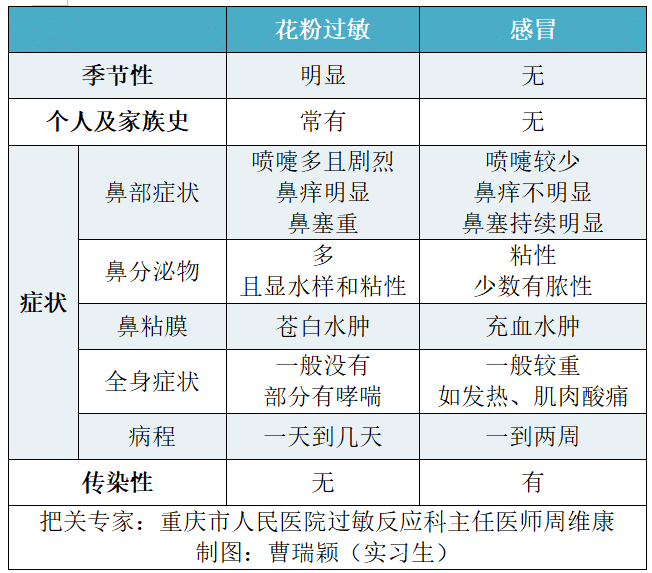How to tell the difference between hay fever and cold?The key difference is here

[ad_1]
In life, some people are particularly prone to “catching a cold” in spring. In addition to sneezing, runny nose, and nasal congestion, they are also accompanied by symptoms such as nasal itching and tearing. In fact, this is not a cold, but a hay fever allergy. How should netizens distinguish whether they have a cold or a hay fever allergy? Zhou Weikang, Chief Physician of the Allergy Department of Chongqing People’s Hospital, explained to netizens about allergies in the pollen season.
Diagram showing the difference between hay fever and the common cold
Zhou Weikang explained the different symptoms of pollen allergy and common cold. He introduced that pollen allergy has obvious nasal itching, generally without systemic symptoms, and the course of the disease is one to several days; while common cold has no obvious nasal itching, and systemic symptoms are generally more severe. Severe, some with fever, muscle aches, etc., the course of one to two weeks.
“During the pollen season, patients with pollen allergies often experience symptoms such as allergic rhinitis and allergic dermatitis, which can cause severe allergic asthma, angioedema, and shock.” Zhou Weikang said that some patients with pollen allergies eat raw fruits, nuts and After eating vegetables, contact urticaria will occur in the contact parts of the oral mucosa, and some patients may also involve the skin, gastrointestinal tract, respiratory tract, etc. In severe cases, laryngeal edema and even suffocation may occur.
Zhou Weikang also introduced that wind-pollinated pollen is the main allergen that causes allergies in patients. Every spring, wind-pollinated pollen is mainly tree pollen, and the common spreading plants are elm, poplar, willow, cypress and so on.for
For those with pollen allergies, he recommends 4 ways to prevent allergies:
First of all, when going out, wear a mask, sunglasses, hat, and long-sleeved shirts, and use pollen blockers to smear the nasal cavity.
Secondly, after returning home, wash the face, nasal cavity, eyes and other parts stained with pollen, and change into clean clothes in time.
Third, if you are not sure which substance is causing the allergy, you can go to the hospital to test the allergen. After the pollen season is over, it is recommended to go to the hospital for pollen desensitization treatment to reduce the symptoms of pollen allergy in the second year.
Fourth, people with severe pollen allergies can take anti-allergic drugs for preventive medication one or two weeks before the pollen season.
[ad_2]
Source link

![[Love Wants Sexual Happiness Series 358]Find the culprit and overcome psychogenic erectile dysfunction. Don’t let pressure affect your sexual happiness.](https://chinathenews.com/wp-content/uploads/2024/04/171111-780x420.jpg)

![[Wanqingyi Care]My health, my rights, customized medical methods in the last stage of life](https://chinathenews.com/wp-content/uploads/2024/04/ZZ1-100-780x420.jpg)
![[Kidney Transplantation Special Topic]The survival rate of transplanted kidneys is high without dialysis treatment three times a week](https://chinathenews.com/wp-content/uploads/2024/04/1311-780x420.jpg)



